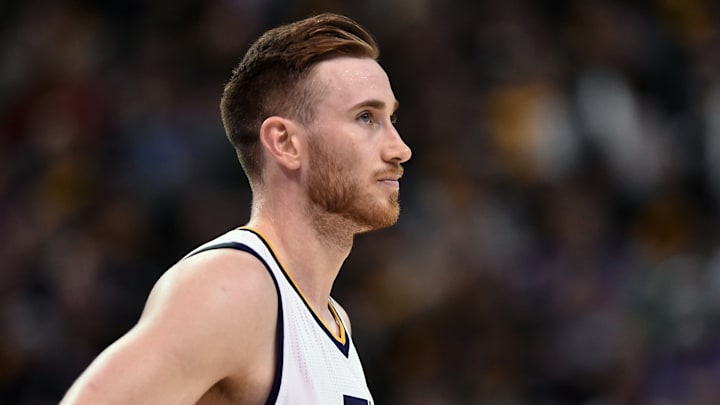Former Jazz star Gordon Hayward announced his retirement from the NBA on social media on August 1. Hayward had a 14-year career playing for the Utah Jazz, Boston Celtics, Charlotte Hornets, and Oklahoma City Thunder.
Though he made most of his money with the latter three teams he played for, Hayward sprouted into the All-Star wing he became during his time with the Jazz. As we all know, things didn't end on good terms between him and the franchise. Far from it, in fact, but man, it is hard not to think where both he and Utah would be right now if he had stayed.
Now, any notion asking how Hayward's career would have turned out had he been a Jazz lifer will get the harsh, obvious, and simple rebuttal of "Who cares?" because that's not what happened. However, it's hard not think about the ramifications that affected both sides when Hayward chose the Celtics over the Jazz in 2017.
Both Hayward's legacy and the Jazz's postseason history could have been drastically different had he stayed. While no one knows how different exactly, there's no denying that the Jazz would have benefited from keeping him long-term knowing that who else was added to that core. Hence, it brings up a few questions.
Could the Jazz have won a title with Hayward, Donovan Mitchell, & Rudy Gobert?
Many have forgotten just how good Hayward was when he was at his peak in Utah - more on that later - but many also forget how well-rounded that 2016-17 Jazz team was. They weren't a contender, but they weren't too far off from being one too.
The problem, of course, was that their breakthrough season coincided with the Warriors going thermonuclear on everyone when they added Kevin Durant. The Jazz got shellshocked in the Western Conference Semifinals, but among those who weren't intimidated was Hayward and Gobert.
That Warriors team would disintegrate two years later, while adding Mitchell, one of the fastest developing stars the Jazz have ever had, could have vaulted them up a level. Sure, not everyone from that team came back (Boris Diaw and George Hill) or were the same the next year (Joe Johnson) but the foundation was there, and it was adding Mitchell.
Neither Hayward or Mitchell have ever been considered the NBA's two very best players, but they weren't too far off from that either. The dominos that could have fallen into place had those two paired up along with Gobert may have risen the Jazz to levels only rivaled by the Stockton/Malone days.
However, it breeds another question.
Could Hayward & Mitchell have co-existed in Utah?
They say basketball isn't played in a vacuum, and they're right. Just because a team has an overabundance of talent doesn't mean it's all going to work. Pairing Hayward with Mitchell wouldn't have been an overabundance, but Hayward's established persona may not have meshed well with Mitchell's up-and-coming development, even if he was a fast riser.
Mitchell was a fast riser because the keys were almost immediately given to him thanks to Hayward's departure. Hence, that would not have been the case had he and Hayward ever been teammates. It is feasible to think that Hayward's presence may have stunted Mitchell's progression at least at first.
However, going back to that underappreciated 2016-17 season, the Jazz saw firsthand what happens when Hayward was paired with another pure scorer like he was with Johnson. In short, that pairing proved fruitful as Johnson's lone full year with the Jazz was his swan song.
Mitchell would not have had the electric rookie season with the Jazz that he did with Hayward on the team. However, who's to say they couldn't have made it work because Hayward proved he could share the scoring burden when he had apt scorers around him.
Would Gordon Hayward's overall legacy have been better had he re-signed?
There are two really big shames about Hayward's career when it's all said and done. One, when he hit his stride in Utah, he really was one of the NBA's very best two-way wings. The problem was that he only had one year where he got to put his skills on full display
Two, when his name comes up, he'll likely be remembered most for suffering one of the most horrific injuries in the history of professional sports that permanently altered his career (don't worry, we're not sharing the clip here).
Not only was Hayward an excellent player on both sides of the floor, but he was an iron man in Utah. He suffered a minor injury every here and there, but he always made it out of the season in one piece. That's what made it all the more baffling when, following his departure from the Jazz, he never seemed to stay healthy.
After leaving Utah, he only crossed the 70-game barrier once, and that was the season he returned from his leg injury. Besides that, it really seemed like he was made of glass post-Utah. Maybe it was bad karma knowing how badly he handled his exit, but his luck staying on the court completely flipped that it surprised absolutely no one when he suffered an injury his last few NBA years.
Maybe that wouldn't have been the case had he stayed, and maybe he would have made a few more All-Star teams while he was at the top of his game. Had the Jazz been a contender, he would have earned plenty more accolades in the process.
Sadly, that never came to fruition. Hopefully, this didn't open any old wounds. With Hayward out of Utah and a reunion out of the question, it's painful to look back and realize how much both sides would have benefited had Hayward and the Jazz stayed together.
